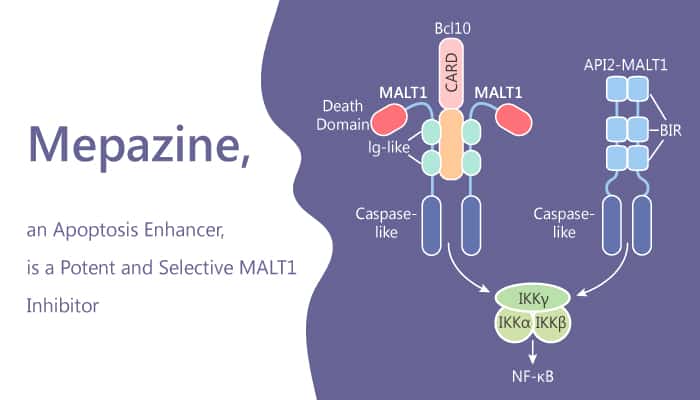Mucosa-associated lymphoid tissue lymphoma translocation protein 1 (MALT1), a positive regulator of NF-κB, is amongst the top highly induced genes. In lymphocytes, MALT1 regulates NF-κB signaling through a scaffold function that transduces signals from the CBM complex to TRAF6, which subsequently activates downstream signaling. As a paracaspase, MALT1 also functions to cleave substrate proteins in activated lymphocytes. Proteolytic activity of MALT1 paracaspase is required for survival of the activated B cell subtype of diffuse large B cell lymphoma (ABC-DLBCL). Mepazine acts as a noncovalent reversible inhibitor.
Mepazine is an inhibitor of the MALT1 protease.

Especially, Mepazine inhibits the constitutive activity of recombinant MALT1. Mepazine is effective in inhibiting GSTMALT1 FL and GSTMALT1 325-760 with IC50 values of 0.83 and 0.42 μM, respectively. In addition, Mepazine selectively inhibits cleavage activity of recombinant and cellular MALT1 by a non-competitive mechanism. Consequently, Mepazine inhibits anti-apoptotic NF-κB signaling and elicits toxic effects selectively on MALT1-dependent ABC-DLBCL cells in vitro and in vivo. Addition of Mepazine results in a strong reduction of MALT1 protease activity in stimulated Jurkat T cells at all time points. Mepazine also causes a severe reduction in PMA/Ionomycin-stimulated MALT1 protease activity in Jurkat T cells. Congruently, Mepazine is able to induce apoptotic cell death in MALT1-dependent ABC-DLBCL.
Mepazine significantly decreases the overall expression as well as the proportion of NF-κB target genes in the signature. Thus, Mepazine impedes the growth of ABC-DLBCL in vivo. Mepazine interferes with the growth and induces apoptosis (Z-VAD-FMK, apoptosis inhibitor) in ABC-DLBCL cell line OCI-Ly10 in vivo. Furthermore, Mepazine causes impaired T cell activation as well as reduces viability that is selective for the ABC subtype of DLBCL.
All in all, Mepazine acts as a potent and selective MALT1 paracaspase inhibitor. Mepazine affects the viability of ABC-DLBCL cells by enhancing apoptosis.